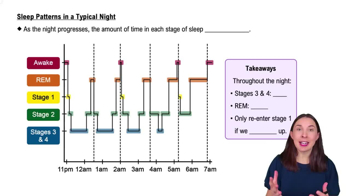Table of contents
- 1. Introduction to Psychology1h 43m
- 2. Psychology Research2h 20m
- 3. Biological Psychology2h 41m
- 4. Sensation and Perception28m
- 5. Consciousness and Sleep32m
- 6. Learning41m
- 7. Memory34m
- 8. Cognition37m
- 9. Emotion and Motivation35m
- 10. Developmental Psychology33m
- 11. Personality48m
- 12. Social Psychology41m
- 13. Stress and Health41m
- 14. Psychological Disorders44m
- 15. Treatment47m
5. Consciousness and Sleep
Sleep
Struggling with Psychology?
Join thousands of students who trust us to help them ace their exams!Watch the first videoMultiple Choice
_____ cause the brain to alter its interpretation of sensations.
A
Opioids
B
Hallucinogens
C
Barbiturates
D
Amphetamines
 Verified step by step guidance
Verified step by step guidance1
Begin by understanding the key terms in the question. The question is asking about substances that cause the brain to change how it interprets sensory information.
Identify the category of drugs known for altering perception. These are typically substances that affect the brain's sensory processing.
Consider the effects of each option: Opioids, Barbiturates, Amphetamines, and Hallucinogens. Reflect on which category is known for causing significant changes in perception and sensory interpretation.
Recall that Hallucinogens are a class of drugs that can cause profound changes in perception, mood, and cognitive processes, often leading to visual or auditory hallucinations.
Conclude that Hallucinogens are the substances that cause the brain to alter its interpretation of sensations, as they are specifically known for their ability to distort sensory experiences.

 3:25m
3:25mWatch next
Master Circadian Rhythms with a bite sized video explanation from Hannah Gordils
Start learningRelated Videos
Related Practice


































































































![Race, Genes and IQ Differences | Bret Weinstein [Mini Clip]](https://img.youtube.com/vi/IztL_m3pd70/mqdefault.jpg)



































































































